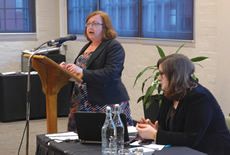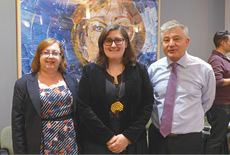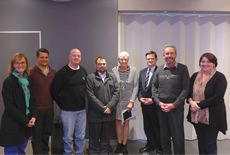Representatives from the IEU and the NSW Teachers Federation joined forces recently in response to member concerns regarding the role of VET in the curriculum and the seeming submersion of education in preference to training and compliance.
The two unions held a joint seminar on 10 August to hear a presentation by University of Melbourne lecturer Kira Clarke from the Centre for Vocational and Educational Policy.
Professor Clarke has done extensive research on VET and published a study in 2014 Strengthening VET in Schools which found VET was not serving students’ needs well and suggested a model that does not use national training packages, but rather one that includes foundational, broad skills and early career exploration that is resourced and supported. The current model of vocational learning is not achieving what it set out to.
IEU Assistant Secretary Mark Northam said it was time for BOSTES to look at a better way of doing things.
“VET teachers are weighed down by regulation and compliance which detracts from their classroom interactions. This is diminishing the role of the teacher to such an extent that compliance is ruling over education,” Mark said.
“It’s time to put teachers back in the driving seat.”
Raelene Maxworthy is a VET Teacher at McCarthy Catholic College Tamworth.
She said employers and BOSTES needed to start taking note of the concerns raised by VET teachers and Professor Clarke’s research.
“It’s time to get education back as the main agenda not ‘industry’,” Raelene said.
“I’m asking how we get effective change. Professor Clarke has found problems in the structure of VET – the workplace, the school culture, the quality of VET teaching and its efficacy in general linked to senior certificates like the HSC and ATAR.
“The workload of VET teachers is huge with the continuous improvement model and performance development logs and evidence collection. Having to satisfy BOSTES, ASQA and RTO requirements is a workload creep that is impacting teachers, when it’s been significantly demonstrated to be weak in its effectiveness for student outcomes and further training.
“I want to see big picture change so that the tail is no longer wagging the dog.”
IEU Council Rep and St Joseph’s Catholic College Albion Park Teacher Glen Lowe said it was great to see both sectors (government and non-government) adopting a common stance.
“I hope this will make BOSTES and the employers take note; we share a common sentiment that VET is deserving of a review,” Glen said.
“If we could get some streamlining of the two lots of delivery – ASQA and BOSTES – that would be a step in the right direction.
“That’s causing frustration. There were comments last night from people saying ‘I don’t want to teach VET anymore, it’s too complex’.”
Mark said the discussion would be continued with BOSTES and employers. He also indicated that the continuous model of improvement (constant retraining) and syllabus updates were costly and that efficiencies could be gained if NSW was to review the purpose of VET and more closely align it with the curriculum in comprehensive high schools.
The IEU acknowledges that stand-alone specialist schools with a VET focus do not experience all the complexities comprehensive schools do.
See www.ieu.asn.au for VET video.





































































































































